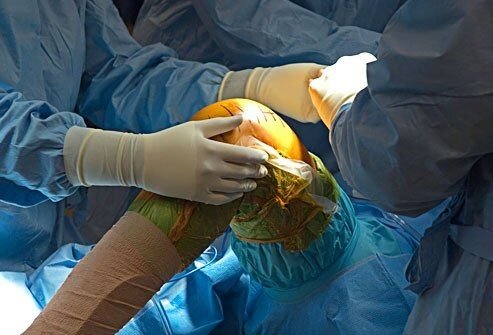
Knee Replacement Surgery: Total, Partial & Robotic Options
Comprehensive Knee Replacement Surgery for Pain Relief
Chronic knee pain and joint degeneration can significantly impact mobility and quality of life. Fortunately, advancements in knee replacement surgery offer effective solutions to restore function and alleviate pain. Whether you need total knee replacement surgery, partial knee replacement surgery, or cutting-edge robotic knee replacement surgery, selecting the right procedure is crucial for long-term success.
Dr. Vivek Logani, Director – Orthopaedics, is a leading expert in knee replacement surgery, specializing in minimally invasive and advanced techniques to ensure optimal patient outcomes.

Types of Knee Replacement Surgery: A Complete Guide
If you’re suffering from chronic knee pain, stiffness, or damaged joints, knee replacement surgery can be a life-changing solution. Thanks to medical advancements, several types of knee replacement surgery are available to meet each patient’s unique needs. From total knee replacement surgery to partial knee replacement surgery, robotic knee replacement surgery, and even non-invasive knee surgery, every option aims to restore mobility, reduce pain, and improve your quality of life.
- Total Knee Replacement (TKR)
Total knee replacement surgery is the most common and widely performed knee replacement . It involves replacing the entire damaged knee joint with a durable artificial implant. This procedure is ideal for patients suffering from severe arthritis, trauma, or complete joint degeneration.
Benefits of total knee replacement include:
- Long-lasting pain relief
- Improved joint function
- Enhanced mobility
For the best results, total knee replacement must be followed by dedicated physical therapy for total knee replacement and strict post knee replacement care.
- Partial Knee Replacement Surgery (PKR)
Partial knee replacement is an excellent option when only one part of the knee is damaged. Instead of replacing the whole joint, the surgeon only replaces the damaged compartment, making it a less invasive type of knee replacement.
Advantages of partial knee replacement surgery:
- Preserves natural bone and tissue
- Faster recovery than total replacement
- More natural knee movement
Patients undergoing partial knee replacement should follow a structured plan that includes physical therapy for knee replacement and consistent post knee replacement care to achieve full recovery.
- Robotic Knee Replacement
Robotic knee replacement is an advanced form of knee replacement that uses robotic systems to enhance precision. Whether you’re undergoing total knee replacement or partial knee replacement , robotics can ensure optimal implant alignment and better long-term results.

Benefits of robotic knee replacement surgery:
- Improved alignment and outcomes
- Less tissue damage
- Faster recovery
Patients who choose robotic knee replacement often see faster healing and better joint performance, especially when they commit to physical therapy for knee replacement right from the start.
- Unicompartmental Knee Replacement
A specific type of partial knee replacement, unicompartmental knee replacement is used when only one compartment of the knee is affected by arthritis. This minimally invasive knee replacement requires smaller incisions and offers faster recovery.
Highlights of unicompartmental knee replacement:
- Smaller incision
- Reduced pain
- Faster return to daily activities
Although less invasive, unicompartmental knee replacement still requires proper post knee replacement care and consistent physical therapy for knee replacement to ensure long-lasting success.
- Non-Invasive Knee replacement Options
If you’re not ready for full knee replacement, non-invasive knee replacement may be the right choice. Treatments like arthroscopy, cartilage repair, and regenerative medicine are part of non-invasive knee replacement and can delay or even eliminate the need for major surgery.
Benefits of non-invasive knee replacement:
- Less downtime
- Minimal discomfort
- Natural healing approach
Even after non-invasive knee replacement, engaging in physical therapy for knee replacement is essential to keep the joint strong and flexible and to avoid future deterioration.
Post Knee Replacement Care
Regardless of the type of knee replacement you undergo—whether it’s total knee replacement, partial knee replacement, or robotic knee replacement —a structured post knee replacement care plan is crucial. This includes:
- Wound care to prevent infection
- Medications for pain control
- Weight management and joint protection
- Follow-up visits to monitor recovery
Post knee replacement care also helps prevent complications and speeds up healing.
Physical Therapy for Knee Replacement
Physical therapy for knee replacement begins as early as the day after surgery and continues for several weeks or months. It helps:
- Restore movement and function
- Prevent stiffness
- Strengthen surrounding muscles
For those who have undergone total knee replacement, physical therapy for total knee replacement includes walking exercises, stretching, resistance training, and balance drills. Staying committed to physical therapy for knee replacement is key to returning to a normal, active lifestyle.
Consult Dr. Vivek Logani for Expert Knee Replacement
Whether you’re considering total knee replacement surgery, partial knee replacement, robotic knee replacement, unicompartmental knee replacement, or non-invasive knee replacement, choosing the right expert is crucial.
Dr. Vivek Logani is a renowned specialist in knee replacement surgery. He brings unmatched experience in robotic knee replacement, total knee replacement, and partial knee replacement. His personalized approach to post knee replacement care and focus on physical therapy for knee replacement ensures the best outcomes for every patient.
Book your consultation with Dr. Vivek Logani today and take the first confident step toward a pain-free, active future.